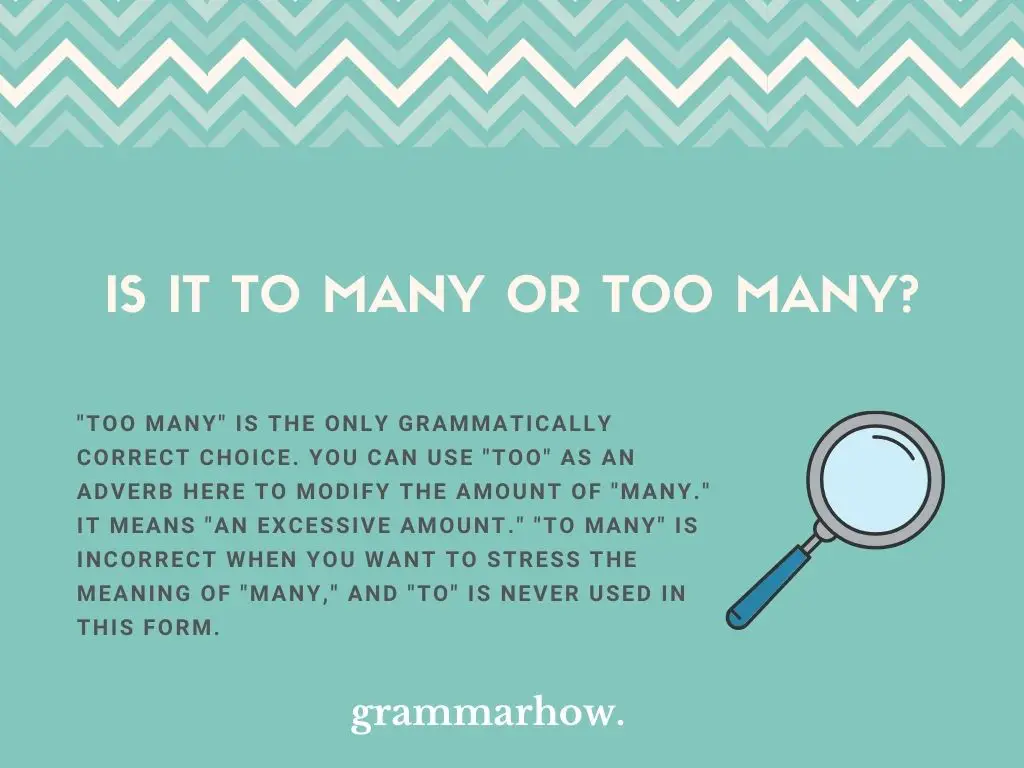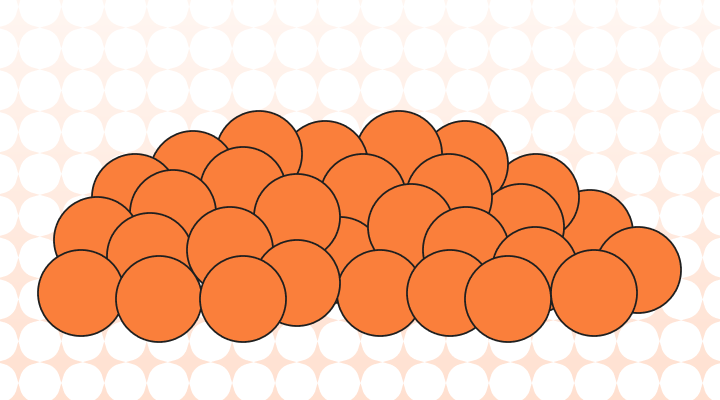"To many" is not a standard phrase in English grammar. "Too many" is a phrase that is used to indicate an excessive or surplus quantity of something.
The distinction between "to many" and "too many" is a common source of confusion in English due to their similar pronunciation. However, they have different meanings and serve distinct grammatical functions.
What does to many mean?
"To many" is not a standard phrase in English grammar. Instead, "to" is a preposition that typically introduces a direction or movement toward something or someone. For instance, "I'm going to the store" indicates the direction of going to a specific place. "To" is also used in various other contexts, such as expressing purpose or the recipient of an action. However, it is not used to convey a quantity or excess as "too many" does.
What does too many mean?
"Too many" is a phrase that is used to indicate an excessive or surplus quantity of something. It conveys the idea that there is an overabundance, more than is necessary or desirable. For example, "There were too many people at the party," implies that the number of attendees exceeded what was comfortable or expected.
Example sentences
- She bought too many groceries, and now the refrigerator is overflowing.
- There were too many guests at the wedding, making it challenging to find a seat.
- Eating too many sweets can lead to dental problems.
- Too many distractions in the office can hinder productivity.
- The team made too many mistakes in the final minutes of the game, costing them the victory.
- He had too many commitments and struggled to balance work and personal life.
- Too many unanswered questions left the audience confused after the movie ended.
- The city had too many traffic jams during rush hour, causing delays for commuters.
- It's essential to set priorities to avoid taking on too many tasks at once.
- Having too many options can sometimes make it difficult to make a decision.
Common idioms/phrases
While the phrase "too many" itself is not commonly used in idiomatic expressions, the word "many" often appears in various idioms and phrases. Here are some common idiomatic expressions and phrases that involve "many":
- Too many cooks spoil the broth: This proverbial expression suggests that when too many people are involved in a task or project, it can lead to confusion and a less effective outcome.
- The more, the merrier: This saying conveys the idea that a larger group of people or things often makes a situation more enjoyable or festive.
- Many hands make light work: This proverb emphasizes the benefits of teamwork, suggesting that when many people contribute to a task, it becomes easier and more manageable.
- A penny for your thoughts: This phrase is often used to ask someone what they are thinking or to inquire about their thoughts or opinions.
- Too much of a good thing: This expression implies that excessive or overindulgent behavior, even if it involves something positive, can have negative consequences.
- With so many fish in the sea: This phrase is used when discussing romantic relationships, implying that there are plenty of other potential partners available.
- Many moons ago: This expression refers to a time in the distant past, often used to reminisce about events or experiences from a long time ago.
- In many cases: This phrase is used when discussing situations or scenarios that occur frequently or commonly.
- Many happy returns: This traditional greeting is often used to wish someone a happy birthday.
- Too many irons in the fire: This idiom suggests that when someone is trying to handle too many tasks or projects simultaneously, it can lead to inefficiency or problems.
In summary, the critical difference between "to many" and "too many" is the meaning they convey. "To many" does not have a standard meaning related to quantity, while "too many" refers to an excessive quantity. To avoid confusion, it's essential to use "too many" when indicating an abundance and choose the appropriate preposition when expressing direction, purpose, or recipient. Understanding this distinction will help you communicate more clearly and effectively in English.
Want to sound like a native speaker?
Engram’s AI-powered grammar checker makes your English sound like a native speaker’s, suggesting natural English expressions on top of fixing grammar, spelling, punctuation, word order, and vocabulary.

Reference














